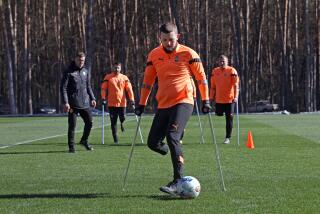A Soldier and a Son : Armenians Embrace Wounded Independence Fighter as Family
- Share via
GLENDALE — There is nothing much new in a soldier, wounded in one of the world’s endless conflicts, coming to the United States for treatment as the guest of a group of concerned Americans.
But for Artour Ovtchian, a 21-year-old Armenian, the goodwill gesture he is experiencing is the most important.
Due to the efforts of Glendale’s Armenian community, the largest outside of Asia, Ovtchian may again be able to walk more than a few steps, write, tie his shoes and, he hopes, rejoin the war that has twice almost taken his life.
“Because the United States has not been fighting a war on its soil, it’s very difficult for an American to understand my way of thinking,” Ovtchian said, sitting in a chair in his hospital room and speaking through an interpreter. “Our national pride has been put to the test and for that reason, dying many times is not enough.”
Ovtchian should know. In April, a single Azerbaijani rifle shot just beneath his hairline left him partially paralyzed on his left side. Now, his left arm hangs limply and painfully, although he has regained some movement below the elbow. He is able to walk short distances by dragging his left leg.
Two years ago, he was almost left for dead when he was shot through the left side of his jaw, the bone blown clear out of his head. At the same time, shrapnel embedded in his chest punctured his lungs. Scars along his boyish face from bone grafts and the sun-shaped tracheotomy mark on his throat serve as reminders.
“I was a very handsome, clean-cut boy before the war,” he said simply.
Ovtchian’s chances of returning to the front lines are not good, doctors said. The conflict, only the latest in a century of wars fought by the Armenians in the name of autonomy, has claimed 15,000 lives since the mostly Armenian population of Nagorno-Karabakh, formerly part of the Soviet Union, asserted its independence from Azerbaijan six years ago .
A soldier since he was 16, Ovtchian said he plans to continue in a supporting role if he cannot return to the battlefield. But one day, he would like to be a lawyer and protect the rule of law in his new nation.
“I don’t enjoy the war condition and we have a lot of other problems as well,” Ovtchian said. “I don’t wish that your or any other city would suffer the way we have. And we are still suffering.”
Ovtchian was brought to Glendale Adventist Medical Center by the Armenian National Committee, which has an office in Glendale, and the Armenian Cultural Foundation, based in Glendale. Those groups paid for his trip to Southern California. The hospital is absorbing the estimated $40,000 bill for Ovtchian’s four- to five-week stay.
The groups helping Ovtchian said their efforts allow Americans of Armenian ancestry a chance to reach back, to connect with the old country and the much-abused compatriots their parents left behind.
“It’s hard not to recognize suffering, and when you recognize the suffering is the exact same as affected your family, you can empathize,” said Dr. Steven Kamajian, Ovtchian’s primary physician.
“You become very clannish when all four of your grandparents were orphans,” he continued. “You approach anyone similar to you as family, and I approach this boy as part of my family.”
More to Read
Sign up for Essential California
The most important California stories and recommendations in your inbox every morning.
You may occasionally receive promotional content from the Los Angeles Times.













